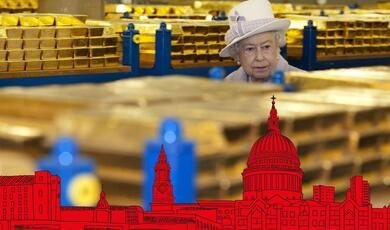Capital-short or value-constrained?
Share
- Details
- Text
- Audio
- Downloads
- Extra Reading
Download Text
Capital-short or value-constrained?
Professor Avinash Persaud
The Great Dot Com Bezzle of October 1998 to February 2000 is still too recent for a lasting testament to be reached. But the hallmarks of previous booms and crashes, from railroads to tulips, are visible enough.
Those who participated, and many who did not, were drunk with excitement. Their liquor was that intoxicating cocktail of new ideas, easy money and scarce time.
Investors were too drunk with the dreams of personal fortunes to notice or worry about those on the take. Embezzlement went largely unnoticed and unheeded, until the consequent crash laid bare the gory details.
Today the corporate titans of the era have been handcuffed and disgraced and mention of a dot com idea raises eyebrows and shifts eyes. But not everything was bad or unworthy during this time. There are some positive legacies and surprising lessons from this end of century boom.
The sources and destination of information have been democratised. You can embed official news reporters into the military - but not the Baghdad blogger. Those dot com companies with room in their business plans for actual revenues, like Amazon, E-bay or Last minute, stepped out from the financial fire alive; even strengthened by the experience. Every-day lives are more touched and eased by the internet today, than in 2000, whether it is booking flights, buying groceries or downloading coursework. I see Ms Jennifer Harris in the audience this evening and academics are waiting eagerly for her on-line National Academic Register to make it easier for businesses and academics to find appropriate partners.
During the dot com boom there was also a development, while not new nevertheless unusual, where ideas, innovation, became equitised, and as a result, spread further. Let me explain.
In those heady days of the turn of the millennium, if you had a good, big, idea, you could approach a venture capital partner to develop the idea and then go to the financial markets to raise the cash you needed to make the idea work. There was a gold rush of new ideas with people trying to stake out territory early. When the ideas were presented to the markets there appeared to be no shortage of cash for seemingly good ideas. During the Great Dot Com Bezzle, new companies raised around $300bn from the public equity markets.
By selling a share in the profits from their ideas, the owners of these ideas could raise hundreds of millions in order to invest in them. This is what I mean by the equitisation of innovation. In this way, bright sparks, ideas and innovation were not constrained by a shortage of capital, only by the limits of valuation.
In the case of the dot com boom, these valuations were wrong, they were castles in the air: optimism built on foundations of hyperbole. This is more obvious in hindsight, but what I am interested in is that fact that valuation not capital, drove the investment boom. This is of huge significance for the many that are capital poor.
While the owners of capital are highly concentrated in a few rich corners of rich countries, the owners of ideas are far more evenly distributed. Almost anyone can have a good idea. If valuation, not capital is key, then there are greater opportunities for the world economy and for the gap between rich and poor to narrow.
There is a more familiar parallel to this concept in the UK property market. Imagine you buy a home in London for the now average price of £250,000 with a 10% deposit of £25,000. One year later, property prices rise by 20%. Without saving a penny of your income, the equity in your house has risen by £50,000 to £75,000, an amount you can access by raising your mortgage borrowing. There is no ISA, or pension plan and few hedge funds that can turn £25,000 into £75,000 in a year.
A significant chunk of individual savings in the UK are as a result of a change in asset valuation not a result of regular savings out of income. Indeed, this is why our savings from income is so low and debt levels so high.
There are limits to this process which we shall return to, but for the moment let us turn to the issue of the valuations of countries that are often the ceiling for valuations of companies.
Although increasing valuations can create more accessible capital than many years of setting aside a small proportion of small incomes, few governments actively think about and develop their country’s brand value. Singapore is a possible exception. If valuations during the dot com boom were initially excessively high, brand values of many developing countries are excessively low and structurally so – they do not often rise and fall with changing fashions.
Let me explain this further with the following example. In May 2002, the credit rating agencies decided to downgrade the credit rating of Japanese government debt to AA. There was general disquiet about this decision for a number of reasons and more than a few occasions, those opposing the decision said with consternation, “Japan now has a lower credit rating than Botswana.” This was a statement designed to inject surprise, any maybe horror.
Credit quality relates primarily to the amount of debt to be paid off and how big the current deficit spending is. Japan’s government debt is 158% of its national income, Botswana’s is just 5%. Japan’s government deficit is 7% of its national income. In Botswana there is a surplus of 8.0%. The comparison of Japan to Botswana is interesting because of what is says about the brand value of Botswana. Until Botswana deals with this negative valuation, all of its exceptionally good fiscal and debt efforts, brought about through some pain and deferred gain, will count for little.
Brand values can change quickly. Just ask Sainsbury, Marks & Spencer or Shell. Ten years ago when investors thought of things Indian, they thought of the local take away. Today they think of outsourcing computer software development or call centres.
The dirty little secret is that these industries have had modest direct impact on the Indian economy, but they have had a dramatic impact on the image of India, which has indirectly supported valuations, and investment. The Indian equity market is up around 80% since the beginning of 2003. These factors have helped to double India’s growth rate.
How do countries address their broader image and valuation? There is a growing consensus of the need for countries to get the basics right – security, an independent judiciary and property rights. If foreign investors worry daily that businesses they had bought legitimately, could be taken away arbitrarily, and that they risk being mugged on the way to court, then you can forget all the tax breaks you can dream of, or all the celebrity adverts you could pay for. Of course, this may be basic stuff, but getting it right is easier said than done, especially in poor countries were the rewards to self-less officials are small, and the temptations, great. Getting it right in a way that is credible to the outside world is harder still. Even rich countries fail to get this right all the time. How many of us question the independence of the US Supreme Court’s decision not to order a recount of the Florida votes in the 2000 Presidential election?
The answer lies in countries having an even greater external orientation in two distinct ways. Let us be politically insane for a brief moment and say that countries with poor brands could contract out those aspects of policy where external credibility is most important to outside experts.
This is of course almost what the Italians, French, Spanish, Greeks and others have done with their monetary policy. It’s called EMU. Previously these countries used to have to pay between ten and twenty percent to borrow because the markets did not trust them, now that their monetary policy is being run in Frankfurt, they can borrow at 4%.
Monetary policy is different from law and order you say. In many Commonwealth countries, the highest court in the land, is not on their land, but is the UK Privy Council. In truth while this relationship makes a lot of legal sense, it has bad colonial associations and these links are being steadily removed. Nationalists argue that sovereignty and pride is about doing things yourself without foreign approval. They forget that there is little sovereignty and pride in poverty or sub-standard institutions. Countries ignore the potential loss of external credibility in their legal systems at their peril. Nor is there really a trade-off between sovereignty and credibility. Countries could establish their own Privy Councils made up of international and local legal experts in equal measure.
Foreign business would place great store on the presence of an external court of appeal.
There are parallels here at the micro- level. There are a number of entrepreneurs in developing countries with good ideas and opportunities, but because developing countries carry such a poor brand valuation, investors turn a blind eye. There is a role here for a business network with an understanding of developing countries to become a clearing house for business ideas, taking up those that have legs, and constructing around them boards of reputable industry experts from around the world, that will develop the ideas and give them credibility in front of an international financial audience.
The second requirement for countries interested in raising their valuations is to open their markets to foreign portfolio and venture capital. Valuations will always be repressed if you limit the size of the market. If you only allow locals to own companies, the value of companies would be lower than if opened up the market to local and foreign buyers or equity partners. While this is the trend there are still too many restrictions on foreign ownership of assets in most developing countries and even some developed countries.
Countries are reluctant to do this because they fear that foreigners would soon own and control the assets of a country or similarly that if values rose as a result of foreign interest, locals would no longer be able to afford local assets such as land and property. These are not illegitimate concerns, especially because locals are liquidity constrained, which means they are more interested in generating cash today than holding assets for the long-term. When the post-communist Polish government give each and every Pole a share in the newly privatised assets, the locals didn’t hold on to them as good long-term investments, they sold them as soon as they could for much needed cash. But this can problem could be addressed through the use of leases. Take property, you could allow foreigners to own long leaseholds of property up to seventy five years say, long enough that the assets would not lose its attractiveness. Only residents would be allowed to own the freeholds. This would ensure that locals would benefit from valuation increases long after the property is first sold to a foreigner.
This idea also deals with another problem. Valuation changes do not create wealth; it shifts it around across place and time. A rise in London property prices, increases the wealth of those who own a home, but reduces the real wealth of those who do not, which includes future generations. But this reduction will be offset when foreigners’ leases expire and the next generation can sell a new lease.
In conclusion, investment is not constrained by capital, it is constrained by valuation. In the eyes of investors, poor countries today offer poor value and until those changes they will remain poor. These valuations are often excessively low because these countries suffer a structurally bad, brand valuation. This can substantially offset the gains that would be expected from sound economic policies. But like company brands, country brands are not stuck. They can change. Of course it has to be done realistically. Barbados could develop a brand as a nice place for professionals to live-in; Monsterrat could not do so too easily. Botswana could be a centre of solar power research and development, Iceland may have a harder time. A country with substantial economic and political uncertainties cannot easily import the credibility of a country without. But countries and companies do have at their disposal a number of ways of importing or borrowing credibility and valuation, perhaps through greater use of external Courts and Boards and by opening up local markets to foreign demand. In large part countries tend to neglect these tools. Yet if they were to succeed in raising long-term valuations, it would unlock a more substantial source of capital than any other currently available.
© Professor Avinash Persaud, 2004
This event was on Thu, 04 Mar 2004
Support Gresham
Gresham College has offered an outstanding education to the public free of charge for over 400 years. Today, Gresham College plays an important role in fostering a love of learning and a greater understanding of ourselves and the world around us. Your donation will help to widen our reach and to broaden our audience, allowing more people to benefit from a high-quality education from some of the brightest minds.


 Login
Login











